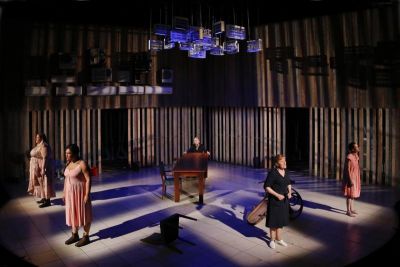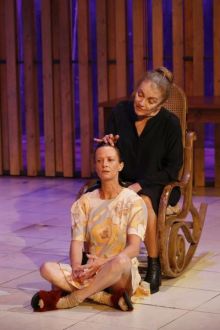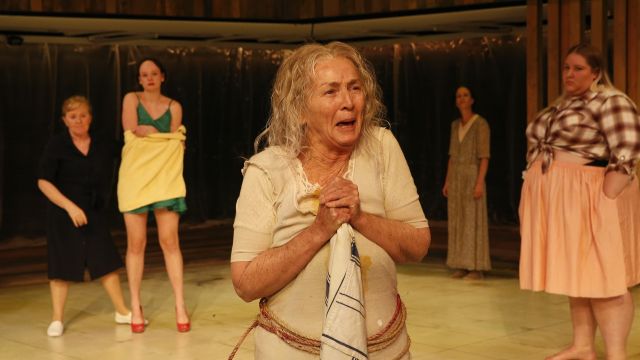The House of Bernarda Alba
Adapting this work to a contemporary Australian environment is brave and ambitious. The result is a challenging, absorbing and resonant offering - though not without dissonance.
Poet Frederico Garcia Lorca’s classic play The House of Bernarda Alba, set in rural Spain of the 1930s, is adapted for the Australian stage by Patricia Cornelius as commissioned by Melbourne Theatre Company and director, then Associate Artistic Director, Leticia Caceres.
Cornelius sets her version in Western Australia; one assumes the Pilbara, with all this implies. This is not an austere stylized piece of Museum Theatre but a vital, robust, demanding, entertaining and at times amusing work.
Although the narrative runs along Lorca’s original trajectory, the perspective is altered by the contemporary setting. Here the grieving wife of a deceased mining mogul bails her four daughters up in the family home for eight untenable weeks of mourning, as opposed to eight years.
Cornelius’s Bernarda, Bernadette (Melita Jurisic), unflinchingly with passionless brutality demands complete control of her empire. She will not tolerate insurgence. The result is acutely relatable to, and very thorny - though not without incongruities and inconsistencies. Often, it is these rifts that generate shifts in interpretation and elucidate more complex understandings of the violence of the repressive oppression we are witnessing.
 The set, by Marg Horwell, suggests breezeways that are open to the elements of the vast ancient landscape beyond. Sound by Jethro Woodward enhances the environment and brings connection to the exterior world. And Musical Composition by Irene Vela augments, with the impressive functionality, assisting the forward motion of the story.
The set, by Marg Horwell, suggests breezeways that are open to the elements of the vast ancient landscape beyond. Sound by Jethro Woodward enhances the environment and brings connection to the exterior world. And Musical Composition by Irene Vela augments, with the impressive functionality, assisting the forward motion of the story.
An hour and forty-five minutes passes remarkably quickly.
A contemporary casting, in that the mix of contrasting physicality, further amplifies the individuality of the feisty albeit suppressed women that are Bernadette’s daughters. This amalgam of inspired performers that don’t completely match is indicative of large family of strong and unique individuals.
Peta Brady plays the eldest daughter, Angela. With a small tense body she physicalizes Angela’s vulnerability and sensitivity to having her self-esteem wracked by circumstances and the mercilessness of her mother. And then, visa versa, she responds to flattery and support by, tangibly, opening out and gaining physical status.
Marti, the middle child played by Candy Bowers, appears more padded by siblings on either side and less at immediate risk of her mother’s ire and more of a conduit for the wellbeing of her sisters. The glowing Magda (Bessie Holland) carries a secret of epic proportions that engenders hope but horrifies her mother. Sue Jones as the failing, victimized grandmother Maria releases some of the oppressive tension with her marvelously realized senile seer.
 Emily Milledge fashions the youngest and most defiant daughter Adele with a dangerous soupcon of shamelessness.
Emily Milledge fashions the youngest and most defiant daughter Adele with a dangerous soupcon of shamelessness.
As cold-blooded matriarch Bernadette, Jurisic, conveys a woman with a life underpinned by fear and ambivalence. She is determined that her household will remain respectable. But her brand of respectability lacks heart or compassion. She has an inflated sense of her own importance that begets isolation. Respectability demands repression. No one is safe in this environment where deception lurks everywhere because too much is suppressed. Ironically forcing her daughters to deny their carnal natures backfires horribly within and without the house.
Julie Forsyth, with her impeccable comic timing, opens proceedings and sets the scene as a kind or chorus commenting on the funeral with liberal dashing of lurid lascivious gluttony. She shines throughout.
In the ‘land of plenty’ where this family lives - arrogance, greed and dominion assures there is not enough ‘to go around.’
Suzanne Sandow
Photographer: Jeff Busby.

Credits
Director – Leticia Caceres
Set and Costume Designer – Marg Horwell
Lighting Designer – Rachel Burke
Composer - Irene Vela
Sound Designer – Jethro Woodward
Stage Manager – Jess Keepence
Cast
Marti – Candy Bowers,
Angela – Peta Brady
Penelope – Julie Forsyth
Magda – Bessie Holland
Maria – Sue Jones
Bernadette – Melita Jurisic
Adele - Emily Milledge
Subscribe to our E-Newsletter, buy our latest print edition or find a Performing Arts book at Book Nook.

